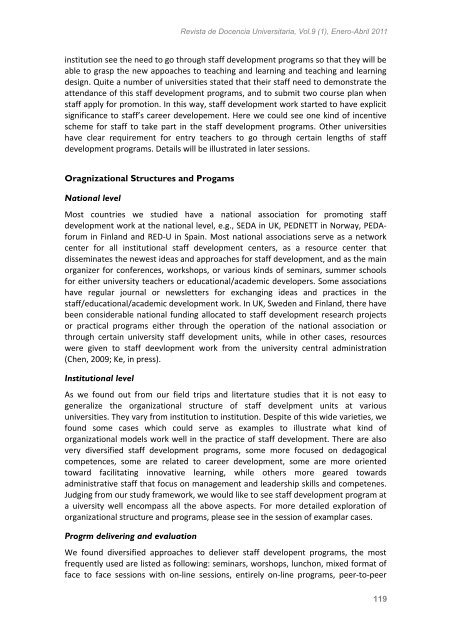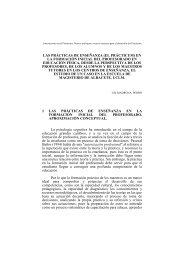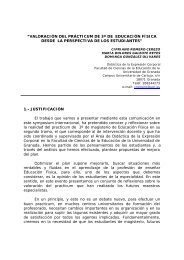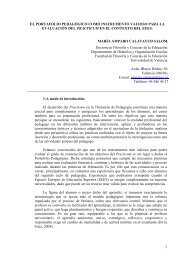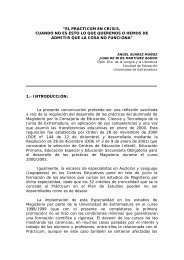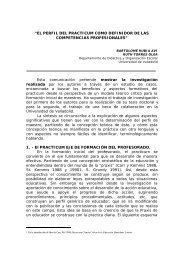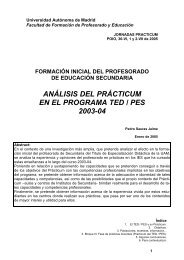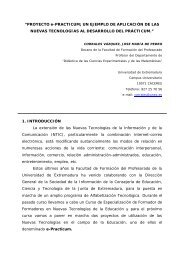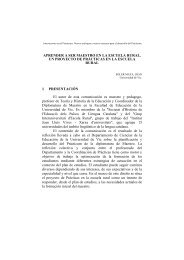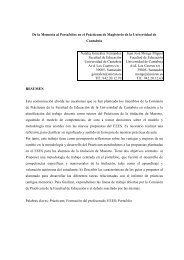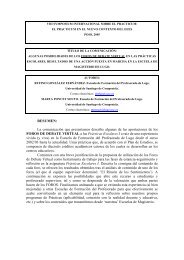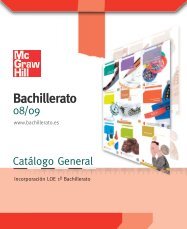descarga completa del vol. 9 nº 1 - REDU. Revista de Docencia ...
descarga completa del vol. 9 nº 1 - REDU. Revista de Docencia ...
descarga completa del vol. 9 nº 1 - REDU. Revista de Docencia ...
You also want an ePaper? Increase the reach of your titles
YUMPU automatically turns print PDFs into web optimized ePapers that Google loves.
<strong>Revista</strong> <strong>de</strong> <strong>Docencia</strong> Universitaria, Vol.9 (1), Enero-Abril 2011institution see the need to go through staff <strong>de</strong>velopment programs so that they will beable to grasp the new appoaches to teaching and learning and teaching and learning<strong>de</strong>sign. Quite a number of universities stated that their staff need to <strong>de</strong>monstrate theattendance of this staff <strong>de</strong>velopment programs, and to submit two course plan whenstaff apply for promotion. In this way, staff <strong>de</strong>velopment work started to have explicitsignificance to staff’s career <strong>de</strong>velopement. Here we could see one kind of incentivescheme for staff to take part in the staff <strong>de</strong>velopment programs. Other universitieshave clear requirement for entry teachers to go through certain lengths of staff<strong>de</strong>velopment programs. Details will be illustrated in later sessions.Oragnizational Structures and ProgamsNational levelMost countries we studied have a national association for promoting staff<strong>de</strong>velopment work at the national level, e.g., SEDA in UK, PEDNETT in Norway, PEDAforumin Finland and RED‐U in Spain. Most national associations serve as a networkcenter for all institutional staff <strong>de</strong>velopment centers, as a resource center thatdisseminates the newest i<strong>de</strong>as and approaches for staff <strong>de</strong>velopment, and as the mainorganizer for conferences, workshops, or various kinds of seminars, summer schoolsfor either university teachers or educational/aca<strong>de</strong>mic <strong>de</strong>velopers. Some associationshave regular journal or newsletters for exchanging i<strong>de</strong>as and practices in thestaff/educational/aca<strong>de</strong>mic <strong>de</strong>velopment work. In UK, Swe<strong>de</strong>n and Finland, there havebeen consi<strong>de</strong>rable national funding allocated to staff <strong>de</strong>velopment research projectsor practical programs either through the operation of the national association orthrough certain university staff <strong>de</strong>velopment units, while in other cases, resourceswere given to staff <strong>de</strong>evlopment work from the university central administration(Chen, 2009; Ke, in press).Institutional levelAs we found out from our field trips and litertature studies that it is not easy togeneralize the organizational structure of staff <strong>de</strong>velpment units at variousuniversities. They vary from institution to institution. Despite of this wi<strong>de</strong> varieties, wefound some cases which could serve as examples to illustrate what kind oforganizational mo<strong><strong>de</strong>l</strong>s work well in the practice of staff <strong>de</strong>velopment. There are alsovery diversified staff <strong>de</strong>velopment programs, some more focused on <strong>de</strong>dagogicalcompetences, some are related to career <strong>de</strong>velopment, some are more orientedtoward facilitating innovative learning, while others more geared towardsadministrative staff that focus on management and lea<strong>de</strong>rship skills and competenes.Judging from our study framework, we would like to see staff <strong>de</strong>velopment program ata uiversity well encompass all the above aspects. For more <strong>de</strong>tailed exploration oforganizational structure and programs, please see in the session of examplar cases.Progrm <strong><strong>de</strong>l</strong>ivering and evaluationWe found diversified approaches to <strong><strong>de</strong>l</strong>iever staff <strong>de</strong>velopent programs, the mostfrequently used are listed as following: seminars, worshops, lunchon, mixed format offace to face sessions with on‐line sessions, entirely on‐line programs, peer‐to‐peer119


